So The Sun has been made to issue a correction following its incorrect reporting on a survey about Muslims late last year (see here). But which publications have been the most repeat offenders in transgressing the Editors’ Code of Practice since the Independent Press Standards Organisation (IPSO) replaced the PCC as press regulator in 2014?
IPSO publishes details of all the rulings on its website, which gives us the chance to do a very brief analysis of the data. Below are some statistics on six of Britain’s daily newspapers – The Sun, The Daily Mail, The Daily Mirror, The Daily Telegraph, The Daily Express and The Times.
The Guardian, The Independent and the Financial Times have all oped not to sign up to IPSO due to concerns that that it is not independent enough and there has been criticism of the regulator in its handling of complaints, so this analysis has to be taken with a pinch of salt as it’s analysing what is widely regarded as an imperfect system. However, it does give us the chance for an overview of what has happened to date, which is useful particularly as papers have a tendency to try and slip their corrections discretely past the public by burying them in a tiny corner on page 38. The article will end with a selection of some of the verdicts passed. In my opinion, the more exposure these transgressions get, the better.
Just a quick note about the Editors’ Code of Practice. This blog is mainly concerned with issues of accuracy in reporting, but the code has numerous other clauses that complainants can file under, including privacy, harrassment, discrimination and confidentiality. See here for full details.
Let’s start by having a look at the number of overall complaints lodged against the six papers. As can be seen in the table below, The Mail has had the most complaints against it with 58, followed by The Telegraph at 42, The Times and The Mirror on 28 each, The Express on 23 and finally (and some may feel surprisingly) The Sun on 19.
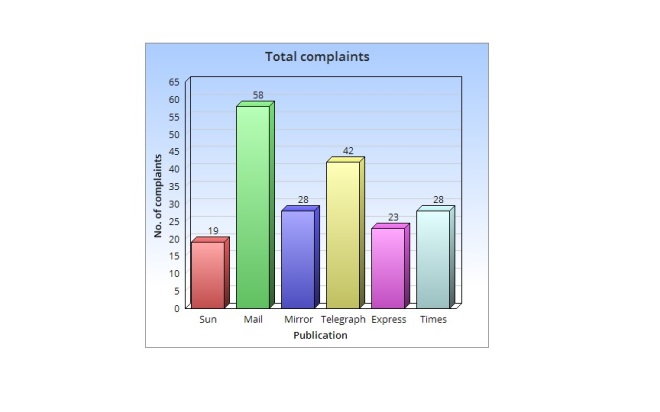 But obviously that’s the gross number of complaints irrespective of outcomes and rulings. The below table breaks the complaints for each paper down into 3 sections – red column where the complaint has been upheld (i.e. where IPSO ruled that the Code of Practice had been breached and the paper had to print an apology notice); blue column where the complaint has not been upheld; and green column where the paper acknowledged its error and printed a Resolution Statement that the complainant was satisfied with, meaning that an IPSO ruling was not required.
But obviously that’s the gross number of complaints irrespective of outcomes and rulings. The below table breaks the complaints for each paper down into 3 sections – red column where the complaint has been upheld (i.e. where IPSO ruled that the Code of Practice had been breached and the paper had to print an apology notice); blue column where the complaint has not been upheld; and green column where the paper acknowledged its error and printed a Resolution Statement that the complainant was satisfied with, meaning that an IPSO ruling was not required.
So the key two columns are really the first two – complaint upheld and resolution statement – as these are where papers have transgressed the code, either by their own admission or by IPSO ruling. Here we can see that The Telegraph and The Express have had the most complaints against them upheld (8 each), followed by The Times (7), The Sun (5) and The Mail and The Mirror on 3 each.
Interestingly, The Mail has the greatest number of overall complaints against it but the (equal) lowest number of complaints upheld. But looking at the number of resolution statements offered, it is again out in front (by quite a margin) with 25. This suggests that The Mail has been most keen, or maybe more effective, in resolving its disputes before IPSO intervene (perhaps to keep its figures low regarding IPSO rulings). Elsewhere with resolution statements, we have The Telegraph on 9, The Mirror on 7, The Times on 5, The Express on 3 and The Sun on 2.
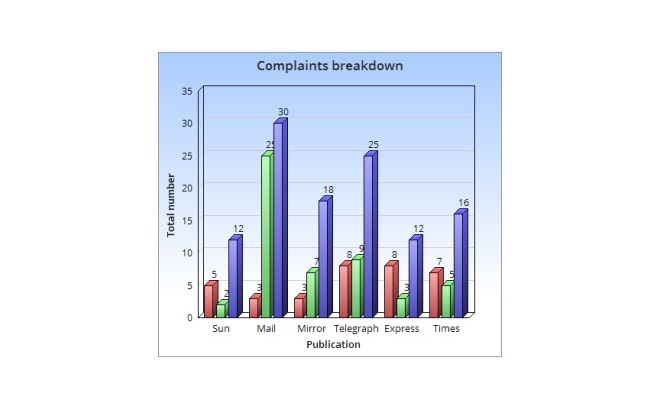 If we then add the columns on complaints upheld and resolution statements, we can get a clearer picture on how many times each paper has transgressed the Editors’ Code of Practice since IPSO has been established (see below table). The Mail heads the field with 28 cases, followed by The Telegraph (17), The Times (12), The Express (11), The Mirror (10) and The Sun (7).
If we then add the columns on complaints upheld and resolution statements, we can get a clearer picture on how many times each paper has transgressed the Editors’ Code of Practice since IPSO has been established (see below table). The Mail heads the field with 28 cases, followed by The Telegraph (17), The Times (12), The Express (11), The Mirror (10) and The Sun (7).
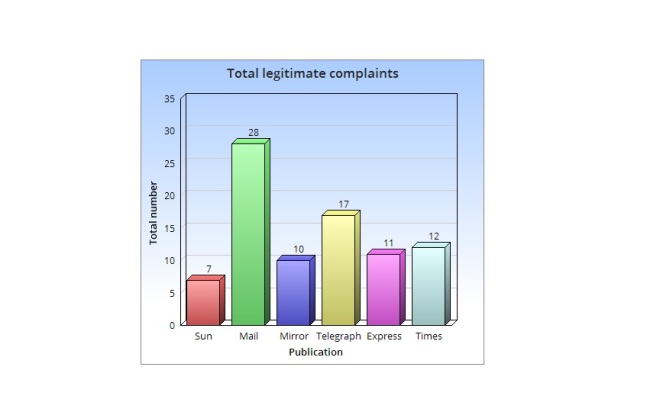 One further issue should be addressed. Some may feel that one of the problems with this analysis is that it’s assessing publications with wide variations in circulation figures. It’s almost impossible to tell what impact this has on the figures as often the complainants are not among the regular readers of the publications they’re complaining against and one would imagine that if a paper published something that was worthy of a complaint, then it would get picked up on and a complaint would be registered regardless of circulation.
One further issue should be addressed. Some may feel that one of the problems with this analysis is that it’s assessing publications with wide variations in circulation figures. It’s almost impossible to tell what impact this has on the figures as often the complainants are not among the regular readers of the publications they’re complaining against and one would imagine that if a paper published something that was worthy of a complaint, then it would get picked up on and a complaint would be registered regardless of circulation.
Still, it does feel a bit odd comparing The Sun with an average daily circulation of 1.86million against The Times with a circulation of 400,000. The easiest way of accounting for this is to work out the number of readers per complaint. So for example, if a publication had an average daily circulation of 1,000 and it had 10 complaints upheld, we could say that it works out as 1 complaint for every 100 readers.
Average daily circulation figures are below. We can see that The Sun is the biggest selling daily, followed by The Mail, then a big gap to The Mirror (just under half the circulation of The Sun), the another drop to The Telegraph, The Express and The Times who all have similar figures.
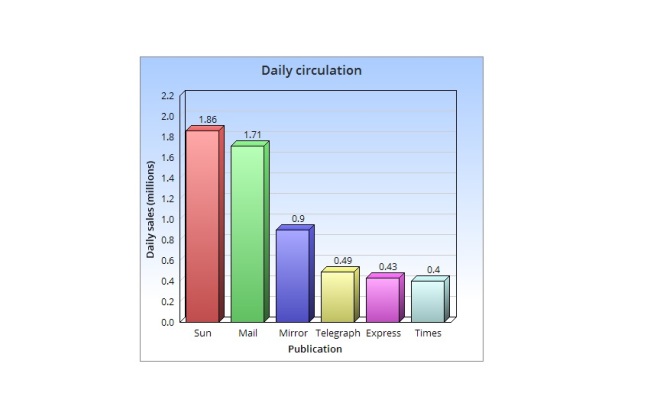 In terms of readers per positive complaints (complaints upheld plus resolution statements), we can see that The Telegraph has the worst result with the fewest number of readers per complaint at 1 complaint for every 28,824 readers, followed by The Times (1 complaint per 33,333 readers), The Express (1 complaint per 39,091 readers), The Mail (1 complaint per 61,071 readers), The Mirror (1 complaint every 90,000 readers) and The Sun (1 complaint per 265,714 readers). See table below.
In terms of readers per positive complaints (complaints upheld plus resolution statements), we can see that The Telegraph has the worst result with the fewest number of readers per complaint at 1 complaint for every 28,824 readers, followed by The Times (1 complaint per 33,333 readers), The Express (1 complaint per 39,091 readers), The Mail (1 complaint per 61,071 readers), The Mirror (1 complaint every 90,000 readers) and The Sun (1 complaint per 265,714 readers). See table below.
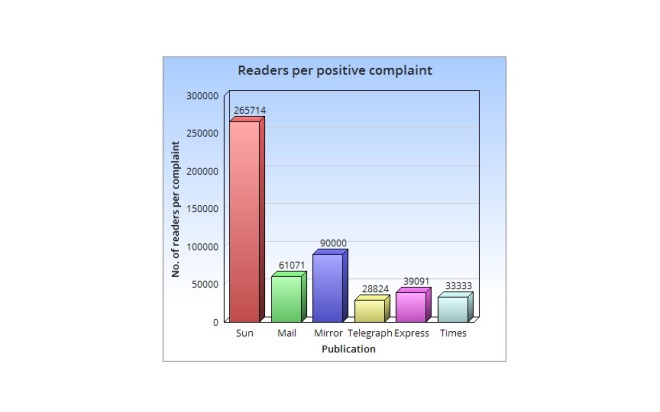 This has been just a basic presentation of quantitative data and has not set out to prove anything. There are a number of limitations which prevents it from being any serious analysis into the performance of papers, for example it hasn’t looked at the nature or type of complaints made. Plus as has already been mentioned, there have been question marks over the adequacy of IPSO as a thorough press regulator.
This has been just a basic presentation of quantitative data and has not set out to prove anything. There are a number of limitations which prevents it from being any serious analysis into the performance of papers, for example it hasn’t looked at the nature or type of complaints made. Plus as has already been mentioned, there have been question marks over the adequacy of IPSO as a thorough press regulator.
To finish off, here is a short summary of some of the upheld complaints and resolution statements to date. A full list of IPSO rulings can be found here and resolution statements can be found here.
DAILY EXPRESS ‘SCHOOL FORCES CHILDREN TO COOK AND CLEAN FOR ASYLUM SEEKERS FOR WORK EXPERIENCE’ (16 Oct 2015)
Report on a German school who had taken a group of children to do some work experience at an asylum centre. The project had taken place but had been the idea of the children themselves and they had not been forced to do so. The Express article omitted this information which was in breach of Clause 1 (accuracy) and the paper was required to publish a correction.
THE SUN ‘COURT JEZTER’ (15 Sept 2015)
Front page article claiming that new Labour leader Jeremy Corbyn will ‘kiss the Queen’s hand to grab £6.2m’, relating to a claim that Mr Corbyn had agreed to join the Privy Council in order to access £6.2m of state ‘short money’ for opposition parties. The complaint was raised due to the fact that membership of the Privy Council is not connected to access to this funding. The Sun was found guilty of breaching Clause 1 (accuracy) and was required to publish a correction on the front page.
DAILY EXPRESS ‘311 LANGUAGES SPOKEN IN OUR SCHOOLS’ (24 July 2015)
Front page article claiming that English was ‘dying out’ in some classrooms, that English is ‘hardly heard at all’ in some schools, that English-speaking pupils are ‘becoming a minority in hundreds of classrooms’ and that lessons are not taught in English in some schools. The investigation found these claims to be false. The data used by the paper, obtained from the Dept. of Education, related to the number of pupils whose first language is not English rather than pupils who could not speak English, as reported by the paper. The ruling found the paper in breach of Clause 1 (accuracy) and it was required to publish a correction on the front page.
DAILY TELEGRAPH ‘GOVE COULD NOT GET X-RAY FOR BROKEN FOOT’ (23 July 2015)
Report that Michael Gove had been unable to get an x-ray on a suspected broken foot because ‘NHS radiology departments are closed on Sundays’. However, Mr Gove had not received an x-ray because he had visited the Minor Injuries unit rather than the Accident and Emergency clinic where radiology departments are open 24 hours a day for emergencies. The paper publish a prompt correction upon receiving the complaint.
DAILY MIRROR ‘MURDERED SOLDIER LEE RIGBY’S FIANCEE ‘FINDS HAPPINESS’ WITH HIS ARMY PAL’ (12 April 2015)
Article on the relationship between Lee Rigby’s fiancee Aimee West and Major Paul Draper which claimed that the two had been on several dates together and that their relationship was ‘common knowledge’, among several other inaccuracies. The paper was found in breach of Clause 1 (accuracy) and published a correction.
DAILY TELEGRAPH ‘4 IN 10 TEENAGE E-CIGARETTE USERS WOULD NOT HAVE SMOKED, WARN HEALTH EXPERTS’ (31 March 2015)
The article misreported on research into e-cigarette use by teenagers. The paper claimed that the teenagers in the study ‘would never have smoked’ whereas they were people who had not smoked to date. The claim that the study participants were e-cigarette users was also misleading as the researchers had only asked ‘have you ever bought or tried electronic cigarettes?‘. The paper was found in breach of Clause 1 (accuracy) and was required to publish a correction.
DAILY TELEGRAPH ‘STURGEON’S SECRET BACKING FOR CAMERON’ (4 April 2015)
Article about a leaked government memorandum claiming that First Minister of Scotland Nicola Sturgeon said that she would rather see David Cameron win the general election than Ed Miliband in a private meeting with French Ambassador, Sylvie Bermann. The information turned out to be incorrect and the paper published a correction.
DAILY MIRROR ‘ACCOUNTANT FUNDED HER 25K PLASTIC SURGERY BILL BY SELLING FAKE GHD HAIR STRAIGHTENERS’ (15 Oct 2014)
Maddison Hawk, sole director of the company Perfect Strand, complained on the grounds that her cosmetic surgery had been completed before the hair appliances had gone on sale. The counterfeit GHD-branded products had been withdrawn by Trading Standards before any sales had taken place and she was fined over £8,000. The paper was found in breach of Clause 1 (accuracy) and was required to publish a correction.
THE TIMES ‘LABOUR’S £1,000 TAX ON FAMILIES’ (24 April 2015)
Front page article that incorrectly calculated that Labour tax proposals for the general election would cost all working families £1,000 per year. The actual proposals were to raise money primarily from companies, the richest individuals and high earning families, with lower income families not affected at all. The paper was found in breach of Clause 1 (accuracy) and was required to publish a correction, which it had already tried to do discretely in a Corrections & Clarifications column on page 24. IPSO ruled that a more prominent correction was required, with a reference to the correction on the front page.
DAILY EXPRESS ‘MONSTERS ARE GIVEN THEIR OWN CELL KEYS’ (25 January 2015)
Front page article reporting that many prisoners now have ‘privacy locks’ on their cells. The sub-headline claimed that ‘Ian Huntley and Rose West are virtually roaming at will’. However, this was misleading as the article explained further down on page 2 that the privacy locks are merely to protect belongings when the prisoners leave the cells. Prison officers have security keys which override the privacy locks, preventing prisoners from roaming free at will. The paper tried to get away with a discrete correction buried away on page 30 but was required by IPSO to publish a correction again on page 2.
DAILY EXPRESS ‘CLIMATE CHANGE CLAIMED TO BE ‘NOTHING BUT A LIE’, CLAIMS TOP METEOROLOGIST’ (23 Oct 2014)
Article incorrectly reporting that the InterAcademy Council had dismissed the Intergovernmental Panel on Climate Change (IPCC) claims about global warming. The paper was found in breach of Clause 1 (accuracy) and was required to publish a correction. The claims in the original article had been repeated on other websites that are not members of IPSO.
DAILY MIRROR ‘BETRAYAL OF OUR BABIES’ (25 November 2015)
Article misreporting on a study into stillborns and early deaths, claiming that 770 babies delivered in NHS hospitals at weekends are stillborn or die within 7 days of the birth, which was 7.3% more than during the week. The actual study had only compared death rates of babies born on a Tuesday with those born on other days, and had found that there were 770 more deaths per year across the week than what would be expected if the rate was the same as for Tuesdays. The paper published a resolution statement on page 2 that the complainant was happy with.
DAILY TELEGRAPH ‘1,000 CHARITIES ‘SPEND LESS THAN HALF’ OF FUNDS ON GOOD WORKS’ (12 December 2015)
Article reporting on research carried out by the True and Fair Foundation into where charity money goes. The article was misleading as it conflated total income with money received in donations. As many charities derive a sizeable percentage of their income from trading, a proportion of that will be reinvested to cover trading costs and will not get recorded as charitable expenditure. The paper published a correction on page 2 which satisfied the complainant, meaning IPSO did not have to make a ruling.
THE SUN ‘DOC THEIR PAY’ (5 November 2015)
Article concerning the dispute between junior doctors and the Dept. of Health which incorrectly stated that junior doctors could dictate the amount of overtime they work and misreported on a British Medical Paper about patient death rates at weekends. The paper published a correction that satisfied the complainant in advance of an IPSO ruling.
DAILY MAIL ‘BRITAIN’S TOP LEGAL OFFICER ADMITS HE ‘DOESN’T KNOW’ IF UK WILL STILL BE SIGNED UP TO EU HUMAN RIGHTS LAW BY 2020′ (16 September 2015)
Article inaccurately stating that the European Convention on Human Rights (ECHR) is EU law when the ECHR is not part of the EU. The paper published a correction that satisfied the complainant before an IPSO ruling.
DAILY MAIL ‘DOUGHNUTS AND PIZZAS ON THE NHS’ (17 August 2015)
Article that reported that £116m had been spent by the NHS on gluten-free junk food, whereas £116m was the total spent by the NHS on foods for all special diets. The amount spent on gluten-free foods was £26.8m and this was generally only for people with coeliac disease. The paper published a correction that satisfied the complainant.
THE TIMES ‘IT’S COMMON SENSE: KILL THE RATS, MOVE THE BATS’ (26 January 2015)
Article about controlling wildlife populations that made a number of inaccurate statements about bats. The paper published a correction that satisfied the complainant in advance of an IPSO ruling.
DAILY MAIL ‘GYPSY GREAT GRANDFATHER’S BODY COULD BE EXHUMED BECAUSE RELATIVES OF MUSLIM IN NEIGHBOURING PLOT DON’T WANT HIM BURIED NEXT TO AN UNBELIEVER’ (10 February 2015)
Article that was also reported with the headline DIG UP GRANDDAD, HE’S NOT A MUSLIM, relating to a reported dispute over burials at Burbage Cemetery. The article claimed that Burbage Parish Council were meeting to discuss exhumation of the body, however the Council lodged a complaint that this was entirely false. The claims were found to be unsubstantiated claims that came from the non-Muslim family. The paper published a correction and also amended the original article online to the satisfaction of the complainant, meaning that an IPSO ruling was not required.
*If you would like to register a complaint with a publication that is registered with IPSO, click here for details of the complaints procedure.
Tabloid Corrections Facebook page: here.
[…] https://tabloidcorrections.wordpress.com/2016/03/30/ipso-who-have-been-the-worst-offenders/ […]
LikeLike